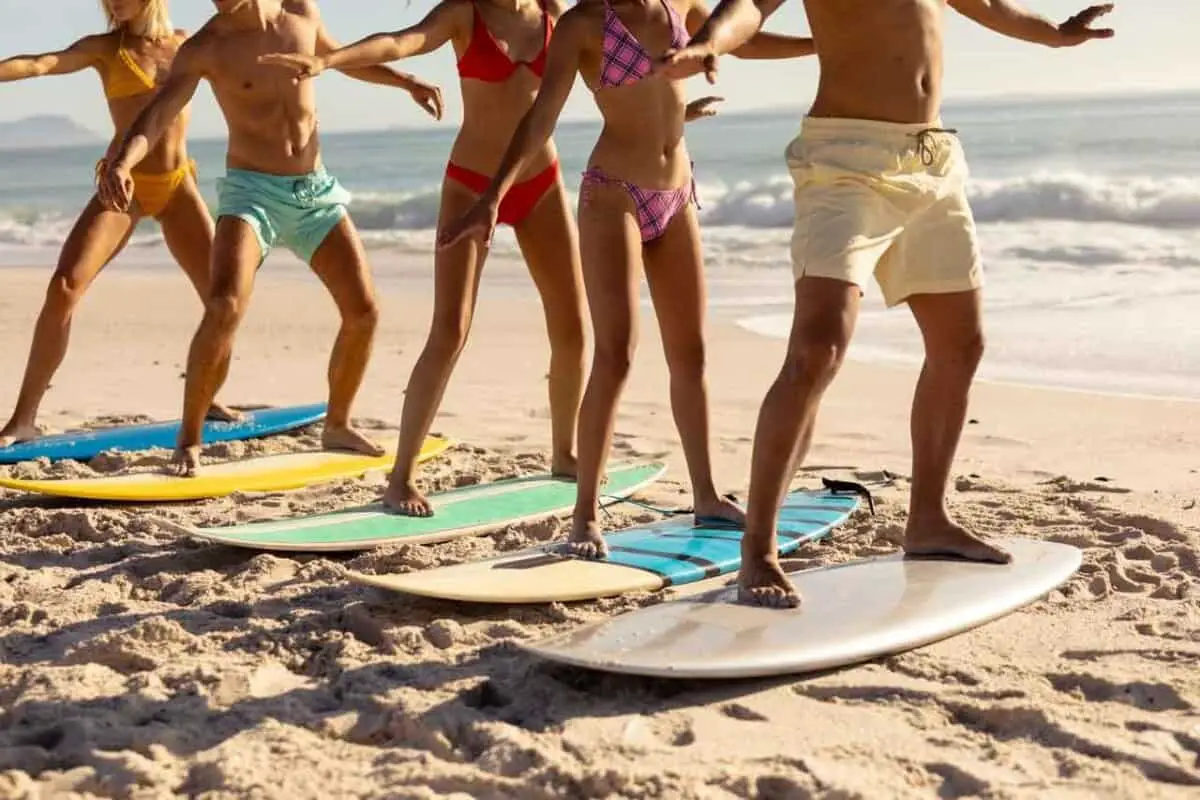Are you thinking about learning how to surf but aren’t sure how to get started? Have you watched The Endless Summer and Point Break countless times and feel ready to experience the exhilaration of the sport for yourself?
You might have some questions before hitting the waves. First, will you need surf lessons? How many might you need before you’re up and riding? We’ve consulted experts and got to the bottom of these questions in this article.
Everyone is unique, and each individual who decides to try surfing will have different goals and expectations. Some people may only need one lesson. Although, in general, expert surf instructors recommend between 3 to 4 surfing lessons for a novice surfer to master the basics of the sport.
The basic skills include paddling out, popping up to a standing position, balancing, and riding a wave. Then, of course, you can continue taking classes until you’re comfortable surfing on your own or have achieved your desired level.
Before signing up for lessons, consider how committed you are to learning the sport. Surfing takes commitment, effort, and a certain level of grit, as you will wipe out a lot. If you’ve taken all of this into consideration and are still ready to hit the waves, then read on.
Do I need to take lessons?
Although plenty of people have taught themselves the art of surfing on their own, most experts agree that it’s a good idea to take lessons to get comfortable with the sport.
Surfing is a complex and challenging sport with a steep learning curve. If you’re a first-timer, it’s essential to learn proper techniques and safety for your time out on the water. Even if you’re an experienced swimmer, you’ll need to know what to do if you get caught in a dangerous riptide (8).
Surfing lessons will also reduce the amount of time it takes you to get up on your board and surfing, and your instructor will be able to correct any bad habits you adopt early on in the process, making it much less frustrating for you along the way.
Experienced surfing instructors have much valuable knowledge to share, such as tips and tricks to timing your paddle out, catching the best wave, and surf etiquette. Also, your surf instructor will provide you with the necessary gear that you might need to get started, such as a wetsuit or rashguard and a surfboard.
If money is a concern, consider taking group lessons instead of one-on-one classes as group lessons are often cheaper. Besides, you could meet some surf buddies in the process!
To recap, here are some reasons why surfing lessons are a good idea for a beginner surfer:
- To familiarize yourself with ocean safety
- To provide you with tips and tricks to paddling out and popping up on your board
- To learn how to read waves
- To learn proper surf etiquette
- To save time and prevent frustration
- To provide you with the necessary gear
- To correct any bad habits early on and provide you with ongoing feedback
Surfing is a physically demanding sport that will, at times, push you past your limits. Injuries caused by surfing occur way less than you expect and they are definitely avoidable. Here are 10 common injuries you can suffer from surfing and how to prevent them from happening.
What should I expect from my first surfing lesson?
Many beginner surfers don’t realize that they will spend much of their first lesson on the sand, getting acquainted with their boards and learning about ocean safety. While this can be disappointing for some who are eager to get in the water, it’s an essential step for learning how to surf.
Your instructor will teach you the anatomy of the board and you will spend a reasonable amount of time practicing proper paddling techniques, correcting your foot positioning, and teaching you how to pop up on your board. Your instructor will want you to get the hang of these techniques before letting you head to the water (9).
Once in the water, you should be in the right state of mind. Don’t expect to get up on the first try and don’t focus on catching waves right away. That will all come with time and practice.
Mastering the art of surfing is a lot about timing your paddle and learning the pop-up technique. So, be prepared to spend a lot of your time on the sand initially rather than catching waves.
What type of board should a beginning surfer use?
Beginners should always use a longboard when they are first learning how to surf. Longboards will benefit them due to their buoyancy, making them more stable and easier to stand on.
Longboards are big and sometimes challenging to carry, but in the water, you’ll find they are easier to paddle out with and are great for balancing and learning the basics of surfing. So, if you want to become a more confident surfer, make sure to start on a longboard.
Frequently Asked Questions by Beginner Surfers (FAQs)
What gear do I need for my first surfing lesson?
If you plan to take a lesson, chances are the company is well prepared with much of what you’ll need. So, think about what you might need for a day at the beach and go from there. Here is a list of things to pack for your first surf lesson:
- A swimsuit (take something comfortable that will stay in place)
- A towel
- Sunscreen
- A lightweight bag to carry your items
- A rashguard (if you have one)
As you can see, what you will need to bring with you is pretty minimal. The surf company providing you lessons should lend you a wetsuit for colder water or a rashguard if you don’t have one. You will also be able to borrow or rent a surfboard there. An expert can help match you with the right board for your level.
Try to leave behind any valuables, such as electronic devices or jewelry. The surfing company won’t be responsible for any items that are lost or damaged.
How physically fit do I need to be to learn to surf?
Surfing is a challenging and physically demanding sport, so you must also consider your fitness level before jumping in. Indeed, surfing requires a certain strength, balance, and endurance since you’re constantly moving in the water, and you will be doing a good amount of paddling.
Ponder whether you’re up to the challenge or have had any physical injury that could hinder your movements on the board. It’s also essential to be a reasonably strong swimmer if you decide to take up surfing.
Additionally, brace yourself for some pretty sore muscles the next day. Even with a good baseline of fitness, you may utilize muscles that you don’t usually work on in your everyday fitness routine.
What is surf etiquette?
Expert surfers agree that it’s important to keep ethics in mind while you surf. In addition to keeping you safe while out on the water, proper surf etiquette involves being aware of other surfers around you and being considerate and respectful.
There are many rules related to surf etiquette, but the most important one seems to be not to steal nor “drop in” on someone else’s wave. As a rule of thumb, the surfer who is closer to the wave’s peak has the right of way and should get the chance to ride the wave in. Dropping in can be dangerous and cause a collision, so always be aware of your surroundings.
For beginners, make sure to surf in a location that is appropriate for your level. Surfing in a spot outside of your comfort zone with waves that are too large and aggressive for your experience is both dangerous and inconsiderate to the more advanced surfers looking to enjoy the waves.
Whenever possible, let other surfers know about your intentions when a wave is coming in, and if an area is too crowded, it’s best to move on to a less crowded spot.
Conclusion
Surfing is a complex and challenging sport. Taking surfing lessons is not really required to learn how to surf, but it is recommended by professionals. If you want to save some time and be more efficient in learning how to surf, you should definitely take lessons from experts rather than trying to learn on your own.
Aside from learning how to surf, surfing lessons also include learning about ocean safety and surfing etiquette. You will also be able to secure the equipment that you will be needing for the sport from your surfing instructor.
Taking surfing lessons is the easiest way to get started with surfing. Learning how to ride the waves from someone who has been practicing the sport for a long time is definitely better than learning from your mistakes. Taking surfing lessons will not only save you time, but it will save you from potential injuries as well.

